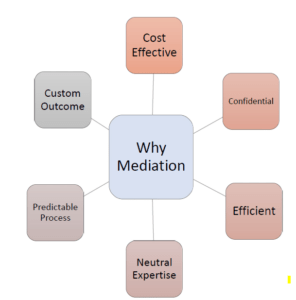You have made the decision to separate from your partner. Now what? You have a house, a pension, maybe you have children, debts, and an inheritance. You have most likely heard nightmare divorce stories from your friends and families, including long court battles, significant delays, and excessive lawyer fees. All of this, combined with the fact that you need to restructure your living arrangements, your finances, and your family life.
The reality is that there is no easy way to do divorce, however there are some options that can ease some of the discomfort. We call these options family dispute resolution process. Family dispute resolution process means a process outside of court that is used by parties to a family law dispute to attempt to resolve any matters in dispute, including negotiation, mediation and collaborative law. Unless it would clearly not be appropriate to do so, families going through separations are encouraged to try to resolve the issues through a family dispute resolution process.
Negotiating amongst yourselves is a good place to start. This is often referred to as the kitchen counter method. It can prove to be difficult, however not impossible and may be helpful in establishing a few base items such as separation date and next steps. Being that a separation brings along some of the most complex legal issues, it’s not an easy task to take on without the support of a professional.
If negotiations between the two of you isn’t working, or if you have reached a point where you need help with some of the more complex issues, a mediator can help you. While a mediator will not impose a settlement, the mediator is a trained professional that will host mediation sessions and support the parties through the negotiation process.

Mediation can look very different from one situation to the next. Your mediator will meet with each of you individually to assess your goals and concerns. Unlike the court setting, a mediator has the option of creating a process that will be customized to your needs. The mediator also has the responsibility of ensuring that any power imbalance, difficulty in communicating, or domestic violence concerns are addressed and do not compromise the mediation. In the cases where these concerns are present, the mediator will suggest options to effectively reduce the power imbalance and/or address concerns of violence and safety, if possible.
Because mediation is confidential, parties are often more willing to explore settlement options thereby allowing the mediator to assist with generating proposals and solutions. You are also able to create plans that are specific to your family’s needs, essentially maintaining control of your future instead of handing your decision-making powers to a third party, such as a judge.

Once you and your ex-partner have decided to give mediation a try, your first step is to contact a mediator and schedule individual intake meetings. Intake meetings are confidential and provide you with an opportunity to outline your primary goals and concerns to the mediator and ask questions. The mediator will also use this meeting to complete a domestic violence screening to ensure mediation is appropriate in your case. Following your intake meeting, your mediator will customise your mediation process which will address your specific needs. You may choose to hold mediation sessions jointly in the same room, or if preferred, shuttle mediation (in separate rooms) might be part of your custom mediation process. If an agreement is reached during the mediation sessions, your mediator will prepare a mediation report outlining the resolution terms. Your mediator may offer to prepare a separation agreement in accordance with the mediator report, you may choose to have a lawyer prepare the separation agreement, or you may decide to simply rely on the mediation report.
There are various options of qualified mediators with different backgrounds and expertise which can help you with your specific situation. A lawyer-mediator will not be able to provide you with legal advice, however they will be able to provide you with valuable information on family law and ensure your separation terms meet certain legal requirements.
This blog post was written by a former member of the Family Law team. For further information, please email family@mannlawyers.com.








